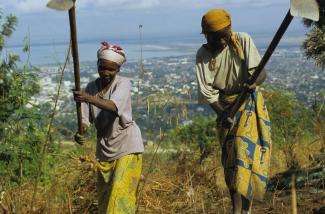Gender
“There should be enough food”
 Böthling/Photography
Widespread distrust makes collective action difficult: farmers in Burundi.
Böthling/Photography
Widespread distrust makes collective action difficult: farmers in Burundi.
What problems do women typically face in post-conflict countries?
Post-conflict countries are normally in transition. “Might makes right” no longer applies, but there still is no real rule of law which needs to be guaranteed by a governmental monopoly on the use of force. During the transition, women remain in danger. Earlier, their husbands would protect them, or at least they were expected to do so. But now many men are dead, and many others are traumatised. The surviving combatants are frustrated, they have no income, and they raise demands, including within the family. Domestic violence tends to increase in post-conflict situations. At the same time, ownership issues – regarding land, for instance – are ambiguous. Women are less likely than men to be involved in the protective alliances built during the war. The irony is that women have become quite competent in taking care of the children and sustaining lives in very difficult circumstances, but that competence is hardly appreciated.
Why is that so?
Social discourse generally revolves around how the former enemies interact with one another and how they share power. In Burundi, for example, the important players are the parties of the Hutus and Tutsis. In contrast, widows’ rights are not discussed. That is not what the men fought for. Women’s accomplishments are simply taken for granted.
What can an organisation such as EIRENE do to improve matters?
There are many things that can be done, but in my experience from various countries, the following three are especially important:
- Our partner organisations, and we ourselves, must prepare women for positions of leadership. It makes sense to practice holding campaign speeches, initially in small groups. The point is that there are hardly any accepted role models for women in public life. They must learn to address men, and they must learn to defend their rights in interaction with them. They need to be articulated.
- It helps to boost informal, semi-formal and formal mechanisms for handling disputes. State institutions typically are not operating properly yet, and many widows don’t trust the police or the courts anyway. It makes a huge difference if they learn how they can assert their rights in difficult times. At the same time, we must overcome stereotypes of victims and perpetrators.
- Men and women must become involved in collectively tackling comprehensive rural development. It is indispensable to take communitarian approaches to food security, education, health care, seed banks and so on. The core challenge is the massive sense of distrust. It makes collective action very difficult. Burundi is a very fertile country, but the hunger index ranks it among the worst places. That need not be so. There should be enough food.
The wars in Burundi and Rwanda erupted when traditional farming suddenly did not suffice to feed growing populations any more. Is traditional farming still viable?
All too often, combatants argue they must fight because resources are scarce. Scarce resources, however, are not a natural reason for war. They could just as well be an incentive for economic development. That would be possible, given the political will. Too often, leaders opt for belligerence. That said, I agree with you that Burundi’s traditional approaches to farming will no longer do. One reason is that many land disputes have not been settled. Refugees are returning home, and they find other people working on their. Moreover, the old farming model is outdated. People used to feed their families with what they grew on their fields and sell the remaining ten percent on local markets. Today, new approaches to processing harvests and marketing are needed. The good news is that they are feasible. The country’s population density is helpful, so infrastructure and services can be provided to all. Things are working out well in Rwanda, after all.
What is different in Rwanda?
One side clearly won the war. President Paul Kagama is implementing developmental policies in an authoritarian way, but his government is not corrupt. The women’s quote of 30 % at all levels of government is fulfilled. Kagame’s government certainly has some serious faults, including military involvement in the DRC, for example. But in Rwanda, it has established a state of law and fostered economic growth.
Anthea Bethge is the executive director of EIRENE, the international Christian peace service.
bethge@eirene.org

